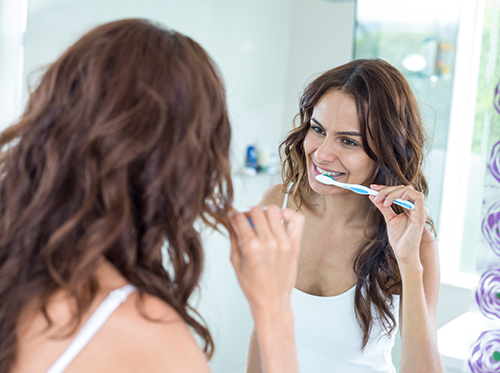Troubles with Cementum? Prevent ‘Em!
November 1st, 2023

Our teeth are a lot more complicated than they look. Beneath that shiny white surface is an entire system of different cell tissues working together to keep each tooth vital and healthy.
- Enamel, the protective exterior of the crown (the visible part of the tooth), is the strongest substance in the body and the first line of defense against damage to our teeth.
- Dentin, the hard tissue under the enamel and cementum, has microscopic tubules that connect to the pulp.
- Pulp, the tissue at the center of the tooth, contains the nerves, blood vessels, and connective tissue that keep the tooth alive.
- Cementum, composed of connective tissue which forms the protective exterior of the root, also attaches to fibers in the periodontal ligaments which hold the teeth securely in the jaw.
Because cementum is below the gum line, it’s generally safe from the cavity-causing conditions that our enamel is exposed to every day. But there are still potential hazards that we should be aware of.
- Cementum Erosion
With a name like “cementum,” it’s logical to assume that this is the hardest tissue in the body. Actually, however, that distinction goes to our enamel. And if even our enamel can be damaged by bacteria and plaque, cementum doesn’t stand a chance!
How does cementum come in contact with cavity-causing bacteria? Gums often recede as a natural part of the aging process, leaving part of the root exposed. Gum disease, failure to brush and floss regularly, and heavy-handed brushing can lead to early gum recession. The newly exposed cementum is now exposed to the same conditions, which cause cavities in our enamel. But a root cavity can be trickier to treat and, because the cementum is not as strong as enamel, can progress more quickly. And if a cavity reaches the pulp, a root canal could be necessary.
But the erosion of cementum doesn’t have to result in a cavity to cause discomfort. When cementum is removed, the dentin beneath is exposed. Dentin, you’ll recall, contains tiny tubes that connect to the pulp of the tooth. The result? Conditions such as heat, cold, even an intake of air can cause tooth sensitivity as they stimulate the nerves in the pulp. If your hot coffee or ice cream cone is suddenly causing you pain, let us know. There are treatments, which can reduce tooth sensitivity.
- Gum Disease (Periodontitis)
In more severe cases of gum disease, the gums pull away from the teeth leaving pockets, which harbor plaque and bacteria. Left untreated, these pockets can become home to infections, which attack and destroy bone structure and connective tissue. Caught early, a treatment called tooth scaling and planing can help. In this type of deep cleaning, your dentist or endodontist will remove plaque and tartar and then smooth the root surface to make it harder for bacteria and plaque to stick. If the gums have receded too far, a gum graft might be necessary to protect the exposed roots.
- Trauma
The same traumas that can damage teeth above the gum line can result in injuries below it. Chewing on hard objects (ice, hard candies, wooden pencils), bruxism (tooth grinding), and sports injuries or accidents can cause cracks in the cementum. If your root is split or fractured, it might be possible to save your tooth, but sometimes extraction is the best option.
So how do you protect your cementum, hidden as it is under your gum line? The same way you protect the more visible parts of your teeth!
- Keep to a healthy daily routine of brushing and flossing. This will help prevent gum disease and keep gum recession at bay. Using a soft brush and brushing firmly but gently will remove plaque while protecting both enamel and cementum. If you notice tooth sensitivity, give us a call!
- Come in to our Los Gatos, CA office for regular dental exams. The best treatment for gum disease is prevention. When you come in for regular checkups, we are able to discover early signs of gum disease before it becomes a serious problem. If you are suffering from more advanced periodontitis, there are treatments available.
- Safety first when it comes to your smile. If you chew on hard objects, talk to Dr. Werner about how to break the habit. If you grind your teeth, see us for solutions. If you play sports, let us know—often a mouthguard can help protect your teeth from injuries that could otherwise lead to more complex procedures or even tooth loss.
Maintaining your healthy dental habits is a lot like cementum—the foundation of a beautiful smile. Nothing complicated about that!




 Website Powered by Sesame 24-7™
Website Powered by Sesame 24-7™